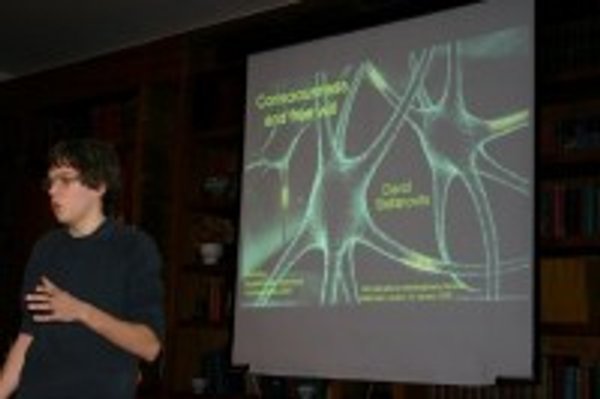For fifteen years scholars of different faculties and countries have been meeting to clarify hot issues at the frontier between science and philosophy. Some of them attend the formation activities provided by Opus Dei, others come moved by the depth and openness of the debates. Sharing an interest in the same matters, means wanting to know what others think about them.
Physicians, physicists, philosophers, biologists, mathematicians – scholars of different specialities, met in Netherhall House attempting to go beyond what each one on his own can reach. Last year they discussed the question: Does God play dice? to elucidate whether randomness in Universe and Evolution is compatible with the assumption that the world is governed by some spiritual agency. The question of this 10th meeting was no less interesting: Has science, and in particular neuroscience, something relevant to say about the soul and freedom? Can their existence be proved or denied? We have interviewed Dominic Burbidge, Lorenzo De Vittori y Antoine Suarez, promoters and speakers at the Interdisciplinary Seminar. Soul and Science as a subject of debate by university students and researchers would seem to correspond to quite different worlds. What were you looking for at this meeting?
We have studied the question of the soul in the light of the experimental data of today’s science, and in particular neuroscience. Anyone who believes in a spiritual soul necessarily assumes that his soul is somehow involved in governing certain movements of his body. When I type this answer or speak to someone, I implicitly assume that I am controlling the movements of my lips, hands, fingers and eyes through the spiritual powers of my soul, i.e. my free will and intellect. Is this statement in contradiction with scientific evidence? This was the basic question of the Seminar.
The usual view seems to be that the soul – if it exists – is spiritual and therefore inaccessible to observation and beyond the reach of science. One does not deny its existence, but the capacity to demonstrate it. How do you overcome this barrier?
We did not have in mind how to prove the existence of the soul, but rather to prove that today’s science acknowledges phenomena happening outside space-time. This implies that the visible phenomena we perceive result, in part, from non-material or spiritual operations. It is enlightening to compare this new scientific perspective with the analysis of Thomas Aquinas in his Summa Theologica (I, q. 110) about the agency of the angels in the corporeal world
Why do we sleep? Is the brain a quantum computer? How has the universe evolved? These questions have been debated in relation with the soul. What were the most interesting ideas in this respect?
Sleep is an important phenomenon for the understanding of the human brain and even the universe. It is a paradoxical phenomenon to a certain extent, for it is not clear what evolutionary advantage sleep provides. The available neurobiological evidence seems to suggest that evolution will not bring about a brain capable of functioning without sleeping.

Man appears to be a being who by nature is incapable of uninterrupted consciousness.
If one accepts this premise, one is naturally led to conclude that man has to pay a price for acting intentionally and in a systematic manner: this price is the random behaviour characteristic of sleep. This fits well with the principles of quantum physics. Nevertheless it would be misleading to compare the human brain with a quantum computer, for this is a device that can be controlled and utilized by any external technician. My brain is not such a device.
An interesting side issue arose from the discussion about the central role the human observer plays in the quantum physical description of the world. In what sense then is the human observer present at the Big Bang? This question is still unsolved.
It is quite astonishing to see the different areas the speakers have come from, above all the wide range of scientific fields. What motivation brings these scholars together?
The basic motivation is to show that there is no contradiction between the deep desire for freedom that each human being has, and the basic principles of science (which contrast with the conclusion Kant drew as a philosopher based of the deterministic science of his time).

According to Benedict XVI, those who allow for God only at the margin of reality are only realists in appearance. The Pope continues to insist about the complementarity of reason and faith. Did the Seminar take into consideration the thought of the Pope?
Ratzinger’s thought relates very directly to the Seminar’s analysis: if we admit that a human being is free, then we also have to admit other (invisible) intelligences behind the phenomena; and, equally, to deny God is to destroy human freedom in the end.
On the one hand we have ascertained theories that use the term ‘realist’ as synonymous with ‘existing in space-time’ or ‘in a corporeal way’. Such ‘realist’ theories reduce causality to a ‘before’ and ‘after’, which is at best confusing.
On the other hand we have stressed that time can no longer be considered as the foundation of causality and order. Today’s science admits domains of existence other than the simple material ones. The truths of mathematics very much support this view. And so does artistic creativity, as the final evening of the seminar showed, in particular the magnificent piano recital by Mladen, one of the Croatian participants.
How would you sum up these days?
We think all the participants to this 10th Seminar have agreed that science today does not impose a deterministic view of the world on us. Thus, whoever wishes to be free can choose to be free. The next Seminar aims to study this conclusion more in depth.
